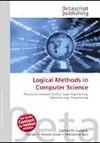局部性与中心性:品种ZG
IF 1
4区 数学
Q4 COMPUTER SCIENCE, THEORY & METHODS
引用次数: 2
摘要
我们研究了一类一元群的元是中心的,即与其他所有元交换。证明了ZG是局部的,即ZG与确定半群的半直积ZG * D等于LZG,即所有局部半群都在ZG中的半群的种类。我们的主要结果是:ZG * D = LZG。我们利用Straubing的延迟定理,通过考虑幂等范畴内的路径来证明这个结果。在此过程中,我们得到了ZG = MNil \vee Com的表征,并对ZG语言进行了表征,即在ZG中有句法单阵的语言:它们正是单态语言和正则交换语言的不相交杂波的有限并。本文章由计算机程序翻译,如有差异,请以英文原文为准。
Locality and Centrality: The Variety ZG
We study the variety ZG of monoids where the elements that belong to a group are central, i.e., commute with all other elements. We show that ZG is local, that is, the semidirect product ZG * D of ZG by definite semigroups is equal to LZG, the variety of semigroups where all local monoids are in ZG. Our main result is thus: ZG * D = LZG. We prove this result using Straubing's delay theorem, by considering paths in the category of idempotents. In the process, we obtain the characterization ZG = MNil \vee Com, and also characterize the ZG languages, i.e., the languages whose syntactic monoid is in ZG: they are precisely the languages that are finite unions of disjoint shuffles of singleton languages and regular commutative languages.
求助全文
通过发布文献求助,成功后即可免费获取论文全文。
去求助
来源期刊

Logical Methods in Computer Science
工程技术-计算机:理论方法
CiteScore
1.80
自引率
0.00%
发文量
105
审稿时长
6-12 weeks
期刊介绍:
Logical Methods in Computer Science is a fully refereed, open access, free, electronic journal. It welcomes papers on theoretical and practical areas in computer science involving logical methods, taken in a broad sense; some particular areas within its scope are listed below. Papers are refereed in the traditional way, with two or more referees per paper. Copyright is retained by the author.
Topics of Logical Methods in Computer Science:
Algebraic methods
Automata and logic
Automated deduction
Categorical models and logic
Coalgebraic methods
Computability and Logic
Computer-aided verification
Concurrency theory
Constraint programming
Cyber-physical systems
Database theory
Defeasible reasoning
Domain theory
Emerging topics: Computational systems in biology
Emerging topics: Quantum computation and logic
Finite model theory
Formalized mathematics
Functional programming and lambda calculus
Inductive logic and learning
Interactive proof checking
Logic and algorithms
Logic and complexity
Logic and games
Logic and probability
Logic for knowledge representation
Logic programming
Logics of programs
Modal and temporal logics
Program analysis and type checking
Program development and specification
Proof complexity
Real time and hybrid systems
Reasoning about actions and planning
Satisfiability
Security
Semantics of programming languages
Term rewriting and equational logic
Type theory and constructive mathematics.
 求助内容:
求助内容: 应助结果提醒方式:
应助结果提醒方式:


